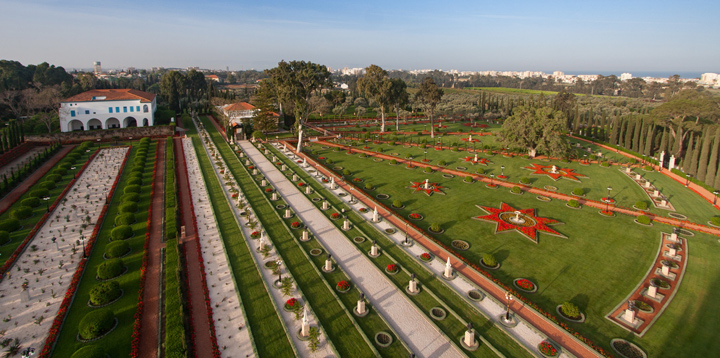The views expressed in our content reflect individual perspectives and do not represent the authoritative views of the Baha'i Faith.
Who speaks for the founder and prophet of a faith after the prophet’s passing? That question has plagued religion throughout history, and arguments over it have caused untold pain and suffering.
In fact, this question has dominated the history of most major religions. Schisms, sects, and even religious wars have resulted from deep, disastrous disagreements over succession and authority. Many of these battles have turned into all-too-human struggles for power, resulting in carnage, hatred, fanaticism, and the subsequent loss of the original spirit the founders of those Faiths taught. At the very least, those internal battles have weakened each religion where they occurred and reduced its ability to teach love, harmony, and unity to the world.
The Baha’i teachings, unlike past religious traditions, deal with this question in a clear, forthright, and immutable way — in a way that is completely unique.
When Baha’u’llah, the prophet and founder of the Baha’i Faith, passed away in 1892, he left a written Will and Testament called the “Book of the Covenant.” In it, he named Abdu’l-Baha, his eldest son — who he referred to as “The Most Mighty Branch” — as his successor and the head of the Baha’i Faith:
O ye that dwell on earth! The religion of God is for love and unity; make it not the cause of enmity or dissension. …
Conflict and contention are categorically forbidden in His Book. This is a decree of God in this Most Great Revelation. It is divinely preserved from annulment and is invested by Him with the splendour of His confirmation. Verily He is the All-Knowing, the All-Wise. …
The Will of the divine Testator is this: It is incumbent upon … My Kindred to turn, one and all, their faces towards the Most Mighty Branch. Consider that which We have revealed in Our Most Holy Book: ’When the ocean of My presence hath ebbed and the Book of My Revelation is ended, turn your faces toward Him Whom God hath purposed, Who hath branched from this Ancient Root.’ The object of this sacred verse is none other except the Most Mighty Branch [Abdu’l-Baha].
Because of this explicit written covenant, the Baha’i Faith, now more than a century after the passing of its founder Baha’u’llah, is the only major world religion which has retained its unity and successfully resisted sectarian division. At some points in its history, a few individuals did attempt to create schism and division among the global Baha’i community, but none have ever succeeded — because Baha’is understand what the Covenant means and follow its provisions.

So on November 25th or 26 every year, Baha’is around the world celebrate the unity of their Faith — and the essential unity of all Faiths — on a Baha’i Holy Day called The Day of the Covenant.
RELATED: How to Understand the Baha’i Covenant
This special Holy Day recognizes and honors the appointment of Abdu’l-Baha as the Center of Baha’u’llah’s Covenant, representing the unbroken, unified line of spiritual guidance that safeguards the Baha’i Faith from division and disunity. It also recognizes the greater and wider covenant that exists between God and humanity, which expresses itself in the prophetic connections that link every Faith.
Baha’is believe in progressive revelation — that God reveals religious and mystical truth through a continuing succession of prophets and messengers across all human history. Progressive revelation connects the world’s great religious teachers, the founders of humanity’s major Faiths, in a great chain of spiritual guidance from God. Buddha, Krishna, Christ, Moses, Muhammad — Baha’is believe that each of the prophets and messengers of God founded a great Faith, and also promised their followers that they would return.
RELATED: The Unity of Religions
When new messengers appear to fulfill that promise, they lead humanity repeatedly back to its spiritual reality. This eternal covenant between God and humanity calls on everyone to recognize and accept the next prophet, forming the system of divine education called progressive revelation. Abdu’l-Baha wrote that Baha’is see this unity of religion as an organic, unbroken chain of God’s messengers, who all taught the same essential Faith:
… it is a basic principle of the Law of God that in every Prophetic Mission, He entereth into a Covenant with all believers – a Covenant that endureth until the end of that Mission, until the promised day when the Personage stipulated at the outset of the Mission is made manifest.
The Baha’i Covenant, clearly delineated in Baha’u’llah’s Will and Testament, continues that unbroken chain of divine guidance and love—not only by promising humanity that another divine messenger would come in the future, but by appointing Abdu’l-Baha as Baha’u’llah’s successor. That appointment provides the organizing principle for the continuation of the Baha’i teachings and the administration of the growing Baha’i community around the world, as well as answering the questions of succession and leadership that have troubled so many past religions. In a talk he gave in New York in 1912, Abdu’l-Baha explained:
As to the most great characteristic of the revelation of Baha’u’llah, a specific teaching not given by any of the Prophets of the past: It is the ordination and appointment of the Center of the Covenant. By this appointment and provision He has safeguarded and protected the religion of God against differences and schisms, making it impossible for anyone to create a new sect or faction of belief. To ensure unity and agreement He has entered into a Covenant with all the people of the world, including the interpreter and explainer of His teachings, so that no one may interpret or explain the religion of God according to his own view or opinion and thus create a sect founded upon his individual understanding of the divine Words.
Baha’u’llah’s appointment invested Abdu’l-Baha with the authority to function as the sole interpreter of the Baha’i writings and named him as the one who would carry out Baha’u’llah’s purpose in the establishment of the Baha’i administrative order. The appointment of Abdu’l-Baha as the Center of the Covenant also recognized that in his personal life, in his words and deeds, Abdu’l-Baha perfectly exemplified the qualities and ideals of a true Baha’i.
Then, after Abdu’l-Baha’s passing, the Baha’i Covenant continued when his own Will and Testament named Shoghi Effendi as the Guardian of the Baha’i Faith and made provisions for the global election of the Universal House of Justice. That continuing Covenant paved the way for a transition from hereditary to democratic succession and governance in the global Baha’i community. The first Universal House of Justice election occurred in 1963, a hundred years after Baha’u’llah proclaimed the beginning of his Faith.
This Baha’i Covenant, a clear line of succession that has kept the unity of the Baha’i Faith intact and inviolable, serves not only to unite and bind together the hearts of the Baha’is around the world — it also demonstrates, to all humanity, that we can achieve a more global unity which includes all people and nations.

















Comments
Sign in or create an account
Continue with Facebookor